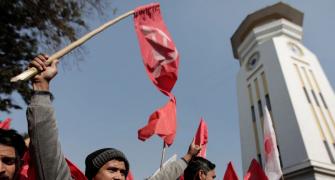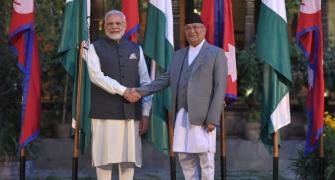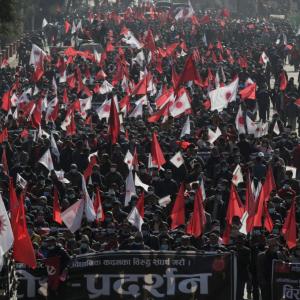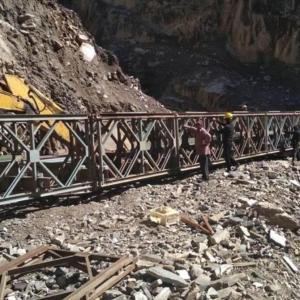Did Oli turn to India when he realised that China was backing unity of the Nepal Communist Party rather than the government led by his faction?
Aditi Phadnis reports.
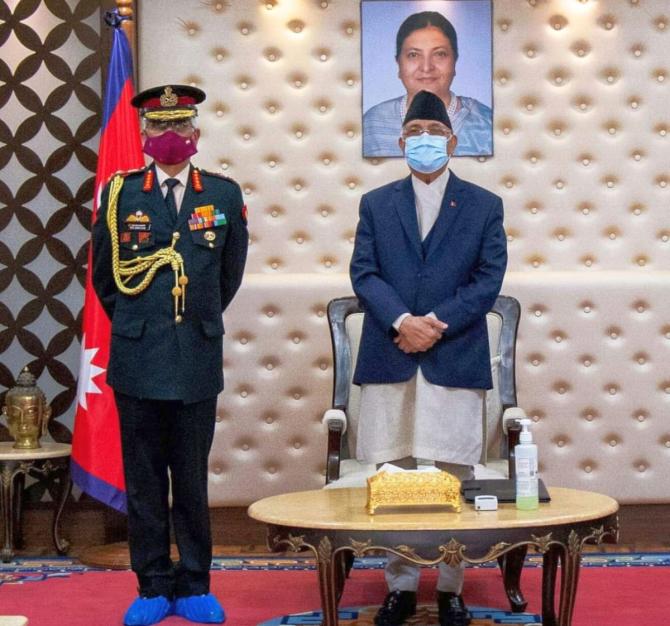
Although India has played down Nepal Foreign Minister Pradeep Gyawali's New Delhi visit as routine -- he arrived on Thursday and substantive talks are scheduled for Friday -- there is speculation, especially in Nepal, about what the visit means.
Gyawali is part of a caretaker government after Prime Minister K P Oli dissolved parliament and ordered elections last month following intra-party dissensions.
He is in New Delhi as part of the sixth India-Nepal Joint Commission meeting.
Although the invitation was extended before Oli dissolved parliament, New Delhi had the option of changing the dates for the meeting to until after the elections.
The Joint Commission has the mandate of discussing a 'gamut of issues'.
So does the business-as-usual engagement mean India wants to have a foot in the door to the Oli administration, even though he is perceived as China leaning?
Chairman of the Nepal Communist Party's splinter faction Pushpa Kamal Dahal 'Prachanda' has said as much.
Ahead of Gyawali's visit, Prachanda said in Kathmandu on Wednesday that Oli's decision to dissolve parliament even though his Nepal Communist Party had a two-thirds majority in the House, was prompted and choreographed by India.
'By dissolving the House, Oli has given a blow to the constitution as well as the democratic republic system, which has been established in the country through seven decades of struggle by the people,' Prachanda said, adding: 'Oli met Samant Goel, the chief of R&AW for three hours at his official residence at Baluwatar, without the presence of any second person, which clearly shows Oli's motive.'
India has maintained a studied silence on recent Nepal developments, including Prachanda's allegations.
New Delhi has issued just one statement that the dissolution of parliament is an 'internal matter for Nepal to decide as per its democratic process'.
Indian Ambassador Vinay Kwatra has met ministers in Kathmandu to continue engagement, though at minimal levels.
Kathmandu expects the row over the India-Nepal border to not be discussed during Gyawali's visit and hopes India will promise some help by way of the COVID-19 vaccine.
In enabling Gyawali's visit, India has signalled its intent of continuing to do business with the government of the day, no matter what its complexion.
In doing so, New Delhi is demonstrating a degree of sophistication in handling the relationship with Nepal.
If Oli's plans to hold elections do not fructify (the matter is being heard by the supreme court as Nepal has no constitutional provision for dissolution of parliament), Indian outreach to the embattled government will be a valued asset later.
If the supreme court rules in Oli's favour and the elections are held as announced, India is looking at Oli and beyond -- the 67-year-old prime minister has had two kidney transplants.
Many Nepal watchers in India believe New Delhi is making a mistake in tacitly legitimising the Oli faction.
Former Indian ambassador to Nepal Ranjit Rae says when Oli realised that China was backing unity of the Nepal Communist Party rather than the government led by his faction, he turned to India.
But, Rae says, these are tactical moves and can lead to long-term after effects that might not be to India's advantage. Others believe India cannot be an idle bystander, because this is "precisely what China wants India to do".

If the Gyawali visit can lead to some deliverable outcomes -- like the dispatch of consignments of vaccines -- it will be hard for Oli's detractors to argue that India is acting against the interests of the people of Nepal.
India's eyes, in the meantime, are trained not just at the current dispensation in the country, but one in which Oli is not present.


